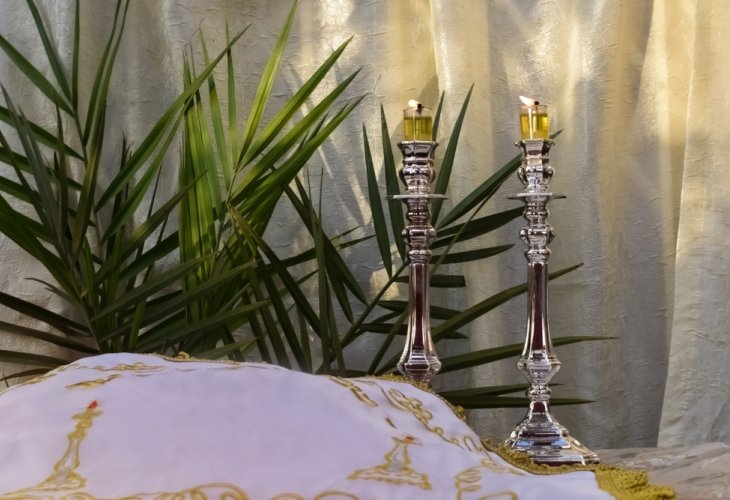Shabbat
The Gift of Shabbat: A Day of Rest, Sanctity, and Purpose
Understanding the meaning, observance, and spiritual power of the Jewish Sabbath
 (Photo: Shutterstock)
(Photo: Shutterstock)Shabbat: A Sacred Covenant
Shabbat, the seventh day of the week, is the Jewish people’s sacred day of rest. It is described as “holier than all other times,” and begins Friday evening at sunset and concludes Saturday night after nightfall.
Observing Shabbat is a core commandment in Judaism. According to Shemot Rabbah (25:12), Shabbat observance is equivalent to fulfilling the entire Torah. The Sages taught that "whoever keeps the Shabbat is as if he fulfills the whole Torah, and one who desecrates the Shabbat is like one who denies the entire Torah." In Tractate Shabbat (118b), it states that one who keeps Shabbat merits a boundless inheritance and that the sins of those who work hard to prepare for Shabbat are forgiven.
Shabbat serves as a testimony that we believe Hashem created the world in six days and continues to oversee it at every moment. As the Torah says: “Remember the Shabbat day to sanctify it… for in six days Hashem made the heavens and the earth… and He rested on the seventh day. Therefore Hashem blessed the Shabbat day and sanctified it” (Exodus 20:8–11). Shabbat also recalls the Exodus from Egypt, as stated in Deuteronomy: “You shall remember that you were a slave in Egypt, and Hashem your God took you out… therefore He commanded you to keep the Shabbat day.”
Honoring Shabbat Through Action and Restraint
Desecrating Shabbat is a severe transgression. By Torah law, one who knowingly violates Shabbat in front of witnesses after being warned is liable to death by stoning (it should be noted that this punishment is not meted out today, since we no longer have an active sanhedrin, Jewish grand legal court, and the Temple is not standing). If Shabbat is violated unknowingly, one is obligated to bring a sin offering for atonement (this is also not in effect today, since we no longer have a Temple).
Shabbat includes both positive and negative commandments. The positive commandments include making Kiddush, honoring Shabbat, and delighting in it. The prohibitions include refraining from the 39 categories of labor, which are based on the tasks required to build the Mishkan (Tabernacle). Each of these categories has numerous derivative forms of labor that are likewise forbidden.
Honoring and enjoying Shabbat involves wearing special clothing, preparing delicious foods, and engaging in activities that bring us joy. The Sages instituted the public reading of the Torah and the Haftarah during the Shabbat prayer service, along with a focus on Torah study.
Shabbat: Core Concepts
Shabbat follows a sacred and structured rhythm:
Candle Lighting: Shabbat candles are lit before sunset on Friday, often by the woman of the house. This mitzvah (commandment) brings peace into the home.
Kabbalat Shabbat and Evening Prayers: Special psalms and prayers are recited as the community welcomes Shabbat, followed by a unique Shabbat Maariv (evening) prayer.
Friday Night Meal: Kiddush is recited over wine, followed by a festive meal. Kiddush fulfills the mitzvah to remember the sanctity of the day.
Shabbat Morning Service: The Shacharit (morning) service includes the Torah reading and the Haftarah, followed by the Musaf prayer.
Shabbat Day Meal: A second festive meal takes place after prayers. Kiddush is also recited before this meal.
Minchah and Seudah Shlishit: The afternoon service is followed by the third Shabbat meal.
Havdalah and Melaveh Malkah: After nightfall on Saturday, the Havdalah ceremony marks Shabbat’s end. This is followed by the “Melaveh Malkah” meal, which symbolically accompanies the Shabbat Queen on her departure.
The official times for Shabbat observance are from sunset Friday to nightfall Saturday. However, it is customary (and meritorious) to add time to both ends, welcoming Shabbat early and ending it later than the official end, as a sign of love and reverence for the day.
Each week in synagogue, one parsha (Torah portion) is read. Over the course of the year, the entire Torah is completed, culminating on Simchat Torah. The weekly Shabbat is thus often named after its parsha, such as "Shabbat Shemini."
Shabbat is not only a day of rest. It is a pillar of Jewish identity and a source of Divine blessing. Embracing its rhythm and sanctity uplifts the home, deepens faith, and connects us with generations past and future.

